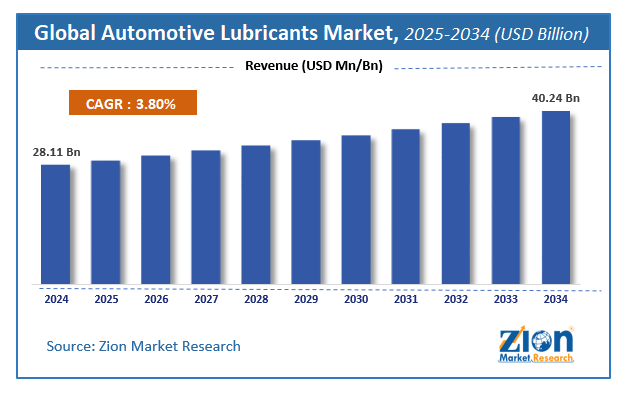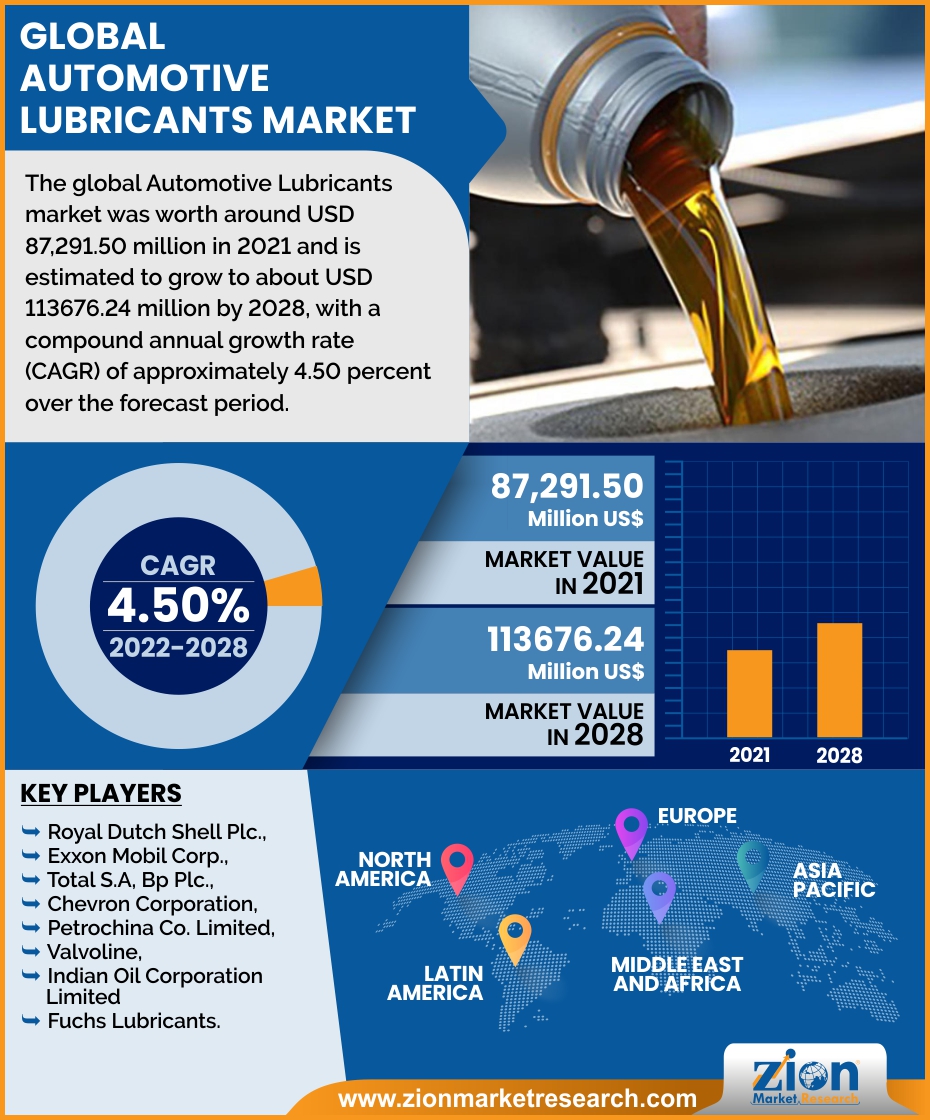Automotive Lubricants Market Size, Share, Trends and Forecast, 2028

Automotive Lubricants Market Size - By Base oil (Mineral Oil Lubricants, Synthetic Lubricants, Semisynthetic Lubricants and Bio-based Lubricants), By Application (Energy Oil, Gear & Brake Oil, Transmission Fluids, Greases and Others), By Vehicle type (Passenger Cars, Light Commercial Vehicles, Heavy Commercial Vehicles and Others) and By Region - Global Industry Overview, Market Intelligence, Comprehensive Analysis, Historical Data and Forecasts 2022 - 2028
| Market Size in 2021 | Market Forecast in 2028 | CAGR (in %) | Base Year |
|---|---|---|---|
| USD 87,291.50 Million | USD 113676.24 Million | 4.50% | 2021 |
Automotive Lubricants Market Industry Prospective:
The global Automotive Lubricants market size was worth around USD 87,291.50 million in 2021 and is estimated to grow to about USD 113676.24 million by 2028, with a compound annual growth rate (CAGR) of approximately 4.50 percent over the forecast period. The report analyzes the Automotive Lubricants market’s drivers, restraints/challenges, and the effect they have on the demands during the projection period. In addition, the report explores emerging opportunities in the Automotive Lubricants market.
To know more about this report, request a sample copy.
Automotive Lubricants Market: Overview
In Automotive Lubricants Market Report, Lubricant is a fluidic material that is used to reduce friction between contact surfaces in order to prevent wear and tear. It is prepared using various additives and base oils from specific groups depending on the end-uses. The most prevalent uses for automotive lubricants are engine, gear, and hydraulic oils. Because of the growing use of high-performance lubricants, the market is expected to grow. The tremendous growth in car sales and infrastructure development in emerging countries has produced a large demand for these coolants and lubricants. Other factors driving the lubricant and coolant industry include rising demand for light passenger and heavy-duty vehicles, rising conventional fuel prices, and an increase in the average vehicle lifespan.
Furthermore, the vehicle oil and coolant industries will benefit from government-imposed tight emission rules. To avoid negative environmental implications, the current trend is to use bio-based lubricants, which will boost the market's total growth. Traditional lubricants have been replaced with synthetic lubricants as the demand for fuel efficiency in automobiles has increased. All of these reasons contribute to the automotive lubricants market's expansion. In terms of energy consumption, the engine components consume over 60% of the vehicle's total energy.
As a result, advancements in automotive lubricants are a great place to start when it comes to improving engine performance. High-performance automobile lubricants have outstanding solvency and hydrophilic properties. The engine runs longer because of the lighter viscosity classes of high-performance lubricants utilized in these automotive lubricants. Furthermore, synthetic lubricants with lower viscosity and improved performance improve engine fuel efficiency to a greater extent.
COVID-19 Impact:
The declining automotive industry, combined with the temporary shutdown of automotive manufacturing units and other industrial activities due to the ongoing pandemic scenario, has reduced demand for engine oil, gear oils, and greases, putting downward pressure on the automotive lubricants market.
Automotive Lubricants Market: Growth Drivers
Automotive Lubricants Market Drivers:
Various factors influence the global demand for automotive lubricants. Lubricants used in industrial operations help the company save money because lubricated machines produce less friction, requiring less fuel and emitting less carbon dioxide. Furthermore, as the population grows, so does the demand for automobiles, which has a direct impact on the market demand for lubricants.
Restraint:
Despite the fact that the global automotive lubricants market is expanding rapidly, several factors are impeding its expansion. The presence of stringent environmental rules and norms governing carbon dioxide emissions stifles growth. The majority of manufacturers are shifting toward electronic vehicles, which is severely limiting the growth of the automotive lubricant market.
Opportunities:
The global market's demand for lubricants is increasing. Increasing vehicle demand in both developed and developing countries drives up global demand for automotive lubricants. Furthermore, significant investment is made in the research and development sector to achieve consistent improvements in oil quality, which also provides various growth opportunities. During the forecasted period, improvements in the quality of semi-synthetic and synthetic oil will also provide growth opportunities.
Global Automotive Lubricants Market Report Scope:
| Report Attributes | Report Details |
|---|---|
| Report Name | Automotive Lubricants Market Research Report |
| Market Size in 2021 | USD 87,291.50 Million |
| Market Forecast in 2028 | USD 113676.24 Million |
| Compound Annual Growth Rate | CAGR of 4.50% |
| Number of Pages | 177 |
| Forecast Units | Value (USD Billion), and Volume (Units) |
| Key Companies Covered | ROYAL DUTCH SHELL PLC., EXXON MOBIL CORPORATION, TOTAL S.A, BP PLC., CHEVRON CORPORATION, PETROCHINA COMPANY LIMITED, VALVOLINE, INDIAN OIL CORPORATION LIMITED, and FUCHS LUBRICANTS. |
| Segments Covered | By Base Oil, By Application, By Vehicle Type, And By Region |
| Regions Covered | North America, Europe, Asia Pacific (APAC), Latin America, Middle East, and Africa (MEA) |
| Countries Covered | North America: U.S and Canada Europe: Germany, Italy, Russia, U.K, Spain, France, Rest of Europe APAC: China, Australia, Japan, India, South Korea, South East Asia, Rest of Asia Pacific Latin America: Brazil, Argentina, Chile The Middle East And Africa: South Africa, GCC, Rest of MEA |
| Base Year | 2021 |
| Historical Year | 2016 to 2020 |
| Forecast Year | 2022 - 2030 |
| Customization Scope | Avail customized purchase options to meet your exact research needs. Request For Customization |
Global Automotive Lubricants Market: Segmentation
The global Automotive Lubricants market is segregated based on Base oil, Application, and Vehicle type.
Based on Base oil, the market is segmented into Mineral Oil Lubricants, Synthetic Lubricants, Semisynthetic Lubricants, and Bio-based Lubricants. The mineral oil segment controls the majority of the automotive lubricants market. Despite the fact that synthetic lubricant adoption and demand are increasing significantly, it is less likely to overtake conventional oil's market share during the forecast period due to the relatively low prices of conventional lubricants.
By application, the market is segmented into Energy Oil, Gear & Brake Oil, Transmission Fluids, Greases, and Others. The engine is commonly referred to as the "heart" of a vehicle, and engine oil plays an important role in the proper operation of an automobile's engine. Engine oil aids in the proper operation of moving parts and keeps the engine cool. Engine oil must be changed on a regular basis to extend engine life and prevent sludge and contaminants from accumulating in the engine.
Recent Developments
- In November 2021, Parkland Corp. will acquire a few assets owned by Lynch Oil through its Parkland USA subsidiary, including five large-format forecourts and convenience stores, two standalone car washes, and two travel centers. This acquisition expands Parkland's presence throughout the Pacific Northwest, complementing its existing commercial, wholesale, and retail operations in Idaho. It will increase annual fuel sales by more than 47 million gallons.
- In November 2019, Nye Lubricants Inc., a company involved in the formulation, manufacturing, and innovation of synthetic products, has been acquired by the FUCHS Group, a supplier and manufacturer based in Germany. It will assist the company in expanding its portfolio of synthetic lubricants.
Regional Landscape
The North American market is expected to see major growth due to increased consumer demand for high-quality and efficient lubricants, the synthetic automotive lubricants segment is rapidly expanding in the region. The Asia-Pacific region has the largest market share in the global market due to being the fastest-growing region. The growing demand for vehicles, combined with the region's growing population, drives the market growth. In addition, the rising demand for semi-synthetic and synthetic lubricants in countries such as Indonesia, Japan, China, and India drives market growth.
Automotive Lubricants Market Competitive Landscape
Some of the main competitors dominating the global Automotive Lubricants market include-
- ROYAL DUTCH SHELL PLC.
- EXXON MOBIL CORPORATION
- TOTAL S.A
- BP PLC.
- CHEVRON CORPORATION
- PETROCHINA COMPANY LIMITED
- VALVOLINE
- INDIAN OIL CORPORATION LIMITED
- FUCHS LUBRICANTS.
The Global Automotive Lubricants market is segmented as follows:
By Base oil
- Mineral Oil Lubricants
- Synthetic Lubricants
- Semisynthetic Lubricants
- Bio-based Lubricants
By Application
- Energy Oil
- Gear & Brake Oil
- Transmission Fluids
- Greases
- Others
By Vehicle type
- Passenger Cars
- Light Commercial Vehicles
- Heavy Commercial Vehicles
- Others
By Region
- North America
- The U.S.
- Canada
- Europe
- France
- The UK
- Spain
- Germany
- Italy
- Rest of Europe
- Asia Pacific
- China
- Japan
- India
- South Korea
- Southeast Asia
- Rest of Asia Pacific
- Latin America
- Brazil
- Mexico
- Rest of Latin America
- Middle East & Africa
- GCC
- South Africa
- Rest of Middle East & Africa
Table Of Content
Methodology
FrequentlyAsked Questions
Engine, gear, and hydraulic oils are the most common uses for automotive lubricants. The market is predicted to rise because to the increasing use of high-performance lubricants. The rapid expansion in vehicle sales and infrastructure development in emerging nations has created a significant demand for these coolants and lubricants.
According to the Market Research report, the global market was worth around USD 87,291.50 million in 2021 and is estimated to grow to about USD 113676.24 million by 2028, with a compound annual growth rate (CAGR) of approximately 4.50 percent over the forecast period.
The North American market is expected to see a major growth due to increased consumer demand for high quality and efficient lubricants, the synthetic automotive lubricants segment is rapidly expanding in the region.
Some of the main competitors dominating the global Automotive Lubricants market include- ROYAL DUTCH SHELL PLC., EXXON MOBIL CORPORATION, TOTAL S.A, BP PLC., CHEVRON CORPORATION, PETROCHINA COMPANY LIMITED, VALVOLINE, INDIAN OIL CORPORATION LIMITED and FUCHS LUBRICANTS.
Lubricants for automobiles are compounds that are used to reduce the amount of friction and wear that occurs between moving parts within the engine, gearbox, and other mechanical components of an automobile. They are particularly prepared to produce a protective layer that reduces wear and tear, prevents corrosion, and lengthens the engine's and other mechanical components' lifespans, all of which are desirable outcomes.
Lubricants for automobiles are normally crafted from base oil, which can be either mineral oil or synthetic oil, or it can be a mixture of the two. After that, the base oil is combined with various additives in order to improve its qualities such as viscosity, oxidation resistance, and detergent capacity. Anti-wear agents, detergents, dispersants, viscosity improvers, and anti-foaming agents are all examples of additives.
Choose License Type
RelatedNews
HappyClients
Zion Market Research
Tel: +1 (302) 444-0166
USA/Canada Toll Free No.+1 (855) 465-4651
3rd Floor,
Mrunal Paradise, Opp Maharaja Hotel,
Pimple Gurav, Pune 411061,
Maharashtra, India
Phone No +91 7768 006 007, +91 7768 006 008
US OFFICE NO +1 (302) 444-0166
US/CAN TOLL FREE +1 (855) 465-4651
Email: sales@zionmarketresearch.com
We have secured system to process your transaction.
Our support available to help you 24 hours a day, five days a week.
Monday - Friday: 9AM - 6PM
Saturday - Sunday: Closed







